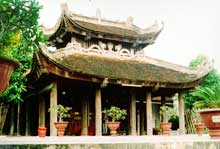In 1998 a miracle occurred. As they do every year, thousands of worshippers, many in ancient dress, marched to Den Do (Do Temple) to honour the eight Kings of the Ly dynasty. But this year was differen

As the festival reached its climax, eight clouds exactly alike sketched a chain across a brilliant blue sky. To the believers, the clouds were incarnations of the kings themselves, looking down from on high at the splendid festival taking place in their memory.
But whether you believe this or not, Do Temple is certainly worth the relatively short trip from Ha Noi.
In Buddhist tradition, a pagoda is to worship Buddha and a temple is to worship a revered person of great importance.
Do Temple pays homage to all eight Ly dynasty kings (the sole Ly Queen - Ly Chieu Hoang - has her own private temple), but at centre stage is the dynasty founder, King Ly Thai To.
Ly Thai To seized control of Viet Nam - then known as Dai Viet - in 1010, kick starting the Ly dynasty that was to reign over the country for more than 200 years.
After 1,000 years, Chinese rule of Viet Nam had ended in AD938, but the Ly dynasty was the first to bring a stable period of independence to the country. Staunch Buddhists, the Ly Kings governed with the rule of law rather than the blade of a sword, generating respect among the people.
Ly Thai To, who founded Thang Long (now Ha Noi) as the capital of Dai Viet, sat on the throne until his death in 1028. In remembrance, his son and the new King Ly Thai Tong had Do Temple constructed in 1030, close to where Ly Thai To was born.
As each subsequent Ly King passed away, their statue moved in with their predecessors, each resplendent above an altar to their person. The last of the Ly leaders was Ly Chieu Hoang, who had the misfortune to preside upon the downfall of the dynasty, forced from power by the upstart Tran dynasty.
Do Temple and its surrounding suffered heavy damage in 1952 during the war for independence from French colonial rule. However, in 1989 the temple was reborn, with designs saved from the 17th century used to build again.
The region around Do Temple is famous for its gooey “Phu The†( husband and wife) rice cakes, given to newlyweds at their wedding. Visitors to the temple have the chance to sample the cakes from the vendors that hang around its entrance.
As the cake traders flutter away, the temple complex reveals itself. Ahead, generous foliage mutes a broad checkerboard path, before the liberal shade ends abruptly at a clay-red crossroads.
To the left is the Dragons Gate, flanked by plump lion statues baring their canines in a wide grin. And to the right is an island pavilion echoing the classic curled eaves of Buddhist style.
Turning left, carved stone dragons slink beneath a smiling roof that shelters the gate’s heavy wooden doors, decorated with meandering dragons.
Past moustachioed guards, of the unblinking variety, is a scorched courtyard in front of the Worshipping House. Two more dragons slither up the sides of an incense burner made to last, their every movement monitored by a pair of kneeling elephants.
Under a flamboyant double-barrelled roof, two exhibitionist soldiers, clad in skimpy loincloths, motionlessly guard the first of many altars. Behind is the Sanctuary House, where the eight Ly Kings sit on golden thrones in golden robes and before golden ornaments.
Back at the crossroads, staccato music floats from the island pavilion, named Thuy Dinh, where a quartet of young women play to a detached audience. They sing local Quan Ho songs in minor key, accompanied by a sparse wooden xylophone.
During French colonial times, Thuy Dinh was so famous that it appeared on money issued by the Bank of Indochina, and nowadays it hosts water puppet theatrics when not a sound stage.
Thuy Dinh sits in the middle of a semi-circle lake, around which harvested rice grains dry in the autumn, destined for the famous cakes.
Do Temple is approximately 16km north-east of Ha Noi, and is just outside Dinh Bang Village.